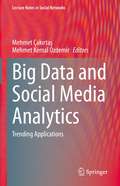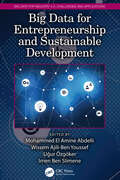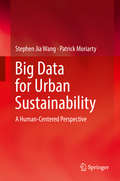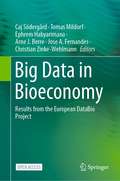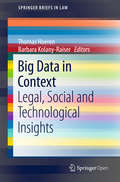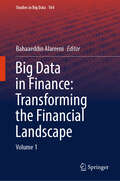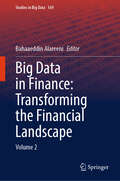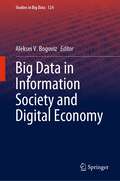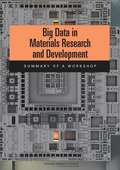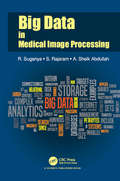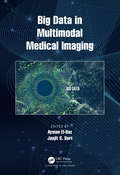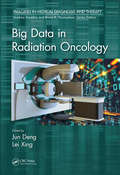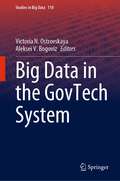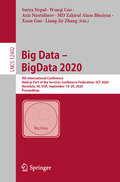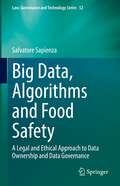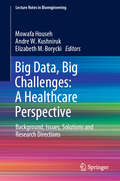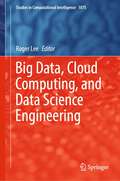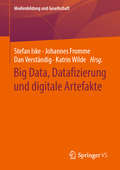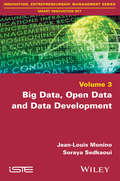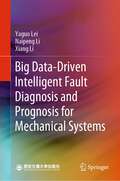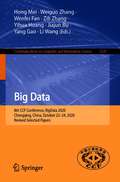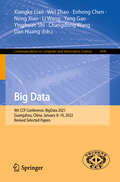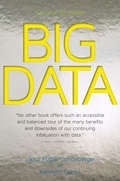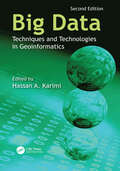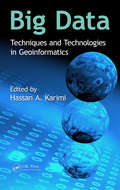- Table View
- List View
Big Data and Social Media Analytics
by Mehmet Çakırtaş Mehmet Kemal OzdemirThis edited book provides techniques which address various aspects of big data collection and analysis from social media platforms and beyond. It covers efficient compression of large networks, link prediction in hashtag graphs, visual exploration of social media data, identifying motifs in multivariate data, social media surveillance to enhance search and rescue missions, recommenders for collaborative filtering and safe travel plans to high risk destinations, analysis of cyber influence campaigns on YouTube, impact of location on business rating, bibliographical and co-authorship network analysis, and blog data analytics. All these trending topics form a major part of the state of the art in social media and big data analytics. Thus, this edited book may be considered as a valuable source for readers interested in grasping some of the most recent advancements in this high trending domain.
Big Data for Entrepreneurship and Sustainable Development (Big Data for Industry 4.0)
by Imen Ben Slimene Uğur Özgöker Mohammed El Amine Abdelli Wissem Ajili-Ben YoussefThis book provides insight for researchers and decision-makers on the application of data in the entrepreneurship and sustainable development sector. This book covers how Big Data for Industry 4.0 and entrepreneurship are effective in resolving business, social, and economic problems. The book discusses how entrepreneurs use Big Data to cut costs and minimize the waste of time. It offers how using Big Data can increase efficiency, enables the studying of competitors, can improve the pricing of products, increase sales and loyalty, and can ensure the right people are hired. The book presents how decision-makers can make use of Big Data to resolve economic and social problems. Analyze the development of the economy and enhance the business climate. This book is for researchers, PhD students, and entrepreneurs and can also be of interest for transforming governments as well as businesses.
Big Data for Urban Sustainability
by Stephen Jia Wang Patrick MoriartyThis book presents a practical framework for the application of big data, cloud, and pervasive and complex systems to sustainable solutions for urban environmental challenges. It covers the technologies, potential, and possible and impact of big data on energy efficiency and the urban environment.The book first introduces key aspects of big data, cloud services, pervasive computing, and mobile technologies from a pragmatic design perspective, including sample open source firmware. Cloud services, mobile and embedded platforms, interfaces, operating system design methods, networking, and middleware are all considered. The authors then explore in detail the framework, design principles, architecture and key components of developing energy systems to support sustainable urban environments. The included case study provides a pathway to improve the eco-efficiency of urban transport, demonstrating how to design an energy efficient next generation urban navigation system by leveraging vast cloud data sets on user-behavior. Ultimately, this resource maps big data’s pivotal intersection with rapid global urbanization along the path to a sustainable future.
Big Data in Bioeconomy: Results from the European DataBio Project
by Christian Zinke-Wehlmann Caj Södergård Tomas Mildorf Ephrem Habyarimana Arne J. Berre Jose A. FernandesThis edited open access book presents the comprehensive outcome of The European DataBio Project, which examined new data-driven methods to shape a bioeconomy. These methods are used to develop new and sustainable ways to use forest, farm and fishery resources. As a European initiative, the goal is to use these new findings to support decision-makers and producers – meaning farmers, land and forest owners and fishermen.With their 27 pilot projects from 17 countries, the authors examine important sectors and highlight examples where modern data-driven methods were used to increase sustainability. How can farmers, foresters or fishermen use these insights in their daily lives? The authors answer this and other questions for our readers. The first four parts of this book give an overview of the big data technologies relevant for optimal raw material gathering. The next three parts put these technologies into perspective, by showing useable applications from farming, forestry and fishery. The final part of this book gives a summary and a view on the future.With its broad outlook and variety of topics, this book is an enrichment for students and scientists in bioeconomy, biodiversity and renewable resources.
Big Data in Context: Legal, Social and Technological Insights (SpringerBriefs in Law)
by Thomas Hoeren Barbara Kolany-RaiserThis book is open access under a CC BY 4. 0 license. This book sheds new light on a selection of big data scenarios from an interdisciplinary perspective. It features legal, sociological and economic approaches to fundamental big data topics such as privacy, data quality and the ECJ's Safe Harbor decision on the one hand, and practical applications such as smart cars, wearables and web tracking on the other. Addressing the interests of researchers and practitioners alike, it provides a comprehensive overview of and introduction to the emerging challenges regarding big data. All contributions are based on papers submitted in connection with ABIDA (Assessing Big Data), an interdisciplinary research project exploring the societal aspects of big data and funded by the German Federal Ministry of Education and Research. This volume was produced as a part of the ABIDA project (Assessing Big Data, 01IS15016A-F). ABIDA is a four-year collaborative project funded by the Federal Ministry of Education and Research. However the views and opinions expressed in this book reflect only the authors' point of view and not necessarily those of all members of the ABIDA project or the Federal Ministry of Education and Research.
Big Data in Finance: Volume 1 (Studies in Big Data #164)
by Bahaaeddin AlareeniThis book offers a comprehensive exploration of how Big Data analytics is reshaping the financial world, providing crucial insights for industry professionals, scholars, and enthusiasts alike. This book delves into the expansive potential of Big Data in revolutionizing financial decision-making, risk management, and operational efficiency. It explores how advanced analytics, machine learning, and artificial intelligence are disrupting traditional financial models, empowering institutions with unparalleled insights and a competitive edge. While highlighting technological advancements, the book also addresses the challenges and ethical considerations inherent in data-driven finance. With contributions from leading experts and thought leaders, this book serves as an indispensable resource for anyone eager to understand and harness the transformative power of Big Data in finance. Embark on a journey through the dynamic convergence of finance and technology, and discover how Big Data is shaping the future of the financial landscape, one data point at a time.
Big Data in Finance: Volume 2 (Studies in Big Data #169)
by Bahaaeddin AlareeniThis book uncovers the potential of machine learning, artificial intelligence, and advanced analytics to empower financial institutions to stay competitive in an ever-evolving market. In the age of digital transformation, big data is revolutionizing the financial industry, reshaping how businesses understand markets, manage risks, and make strategic decisions. "Big Data in Finance: Transforming the Financial Landscape" offers a comprehensive exploration of the cutting-edge technologies and analytics driving this change, making it an essential resource for professionals, scholars, business leaders, and enthusiasts alike. From enhancing operational efficiency to enabling more accurate forecasting, this book delves deep into how data-driven insights are transforming traditional financial models. With practical insights, real-world applications, and contributions from industry leaders, this book provides a balanced perspective on both the opportunities and challenges of data-driven finance. It addresses key ethical considerations, regulatory concerns, and future trends, offering readers a holistic understanding of the dynamic intersection of technology and finance. Discover how big data is shaping the future of finance, and gain the knowledge you need to harness its full potential. Whether you're looking to innovate, optimize, or simply stay informed, "Big Data in Finance: Transforming the Financial Landscape" is your roadmap to success in the new era of digital finance.
Big Data in Information Society and Digital Economy (Studies in Big Data #124)
by Aleksei V. BogovizThis book redefines the essence of the information society and the digital economy, offering a new approach to their management and organization based on big data. The novelty of the new approach is that it ensures the use of the advanced technological capabilities of the Fourth Industrial Revolution to accelerate socio-economic development. The success of the new approach is based on progressive social institutions and advanced big data technology. Theoretical issues, methodological developments, and the author’s applied recommendations are consistently presented in forty chapters distributed in five sections. The book contains cases that reveal the practical experience of the Eurasian Economic Union (EAEU). The intended readership of the book is scientists. The book is interesting and useful for them because it presents an innovative model of information society and digital economy development driven by big data.
Big Data in Materials Research and Development: Summary of a Workshop
by Maureen Mellody"Big Data in Materials Research and Development" is the summary of a workshop convened by the National Research Council Standing Committee on Defense Materials Manufacturing and Infrastructure in February 2014 to discuss the impact of big data on materials and manufacturing. The materials science community would benefit from appropriate access to data and metadata for materials development, processing, application development, and application life cycles. Currently, that access does not appear to be sufficiently widespread, and many workshop participants captured the constraints and identified potential improvements to enable broader access to materials and manufacturing data and metadata. This report discusses issues in defense materials, manufacturing and infrastructure, including data ownership and access; collaboration and exploitation of big data's capabilities; and maintenance of data.
Big Data in Medical Image Processing
by S. Rajaram R. Suganya A. Sheik AbdullahThe field of medical imaging seen rapid development over the last two decades and has consequently revolutionized the way in which modern medicine is practiced. Diseases and their symptoms are constantly changing therefore continuous updating is necessary for the data to be relevant. Diseases fall into different categories, even a small difference in symptoms may result in categorising it in a different group altogether. Thus analysing data accurately is of critical importance. This book concentrates on diagnosing diseases like cancer or tumor from different modalities of images. This book is divided into the following domains: Importance of big data in medical imaging, pre-processing, image registration, feature extraction, classification and retrieval. It is further supplemented by the medical analyst for a continuous treatment process. The book provides an automated system that could retrieve images based on user’s interest to a point of providing decision support. It will help medical analysts to take informed decisions before planning treatment and surgery. It will also be useful to researchers who are working in problems involved in medical imaging.
Big Data in Multimodal Medical Imaging
by Jasjit S. Suri Ayman El-BazThere is an urgent need to develop and integrate new statistical, mathematical, visualization, and computational models with the ability to analyze Big Data in order to retrieve useful information to aid clinicians in accurately diagnosing and treating patients. The main focus of this book is to review and summarize state-of-the-art big data and deep learning approaches to analyze and integrate multiple data types for the creation of a decision matrix to aid clinicians in the early diagnosis and identification of high risk patients for human diseases and disorders. Leading researchers will contribute original research book chapters analyzing efforts to solve these important problems.
Big Data in Radiation Oncology (Imaging in Medical Diagnosis and Therapy)
by Jun Deng and Lei XingBig Data in Radiation Oncology gives readers an in-depth look into how big data is having an impact on the clinical care of cancer patients. While basic principles and key analytical and processing techniques are introduced in the early chapters, the rest of the book turns to clinical applications, in particular for cancer registries, informatics, radiomics, radiogenomics, patient safety and quality of care, patient-reported outcomes, comparative effectiveness, treatment planning, and clinical decision-making. More features of the book are: Offers the first focused treatment of the role of big data in the clinic and its impact on radiation therapy. Covers applications in cancer registry, radiomics, patient safety, quality of care, treatment planning, decision making, and other key areas. Discusses the fundamental principles and techniques for processing and analysis of big data. Address the use of big data in cancer prevention, detection, prognosis, and management. Provides practical guidance on implementation for clinicians and other stakeholders. Dr. Jun Deng is a professor at the Department of Therapeutic Radiology of Yale University School of Medicine and an ABR board certified medical physicist at Yale-New Haven Hospital. He has received numerous honors and awards such as Fellow of Institute of Physics in 2004, AAPM Medical Physics Travel Grant in 2008, ASTRO IGRT Symposium Travel Grant in 2009, AAPM-IPEM Medical Physics Travel Grant in 2011, and Fellow of AAPM in 2013. Lei Xing, Ph.D., is the Jacob Haimson Professor of Medical Physics and Director of Medical Physics Division of Radiation Oncology Department at Stanford University. His research has been focused on inverse treatment planning, tomographic image reconstruction, CT, optical and PET imaging instrumentations, image guided interventions, nanomedicine, and applications of molecular imaging in radiation oncology. Dr. Xing is on the editorial boards of a number of journals in radiation physics and medical imaging, and is recipient of numerous awards, including the American Cancer Society Research Scholar Award, The Whitaker Foundation Grant Award, and a Max Planck Institute Fellowship.
Big Data in the GovTech System (Studies in Big Data #110)
by Victoria N. Ostrovskaya Aleksei V. BogovizThis book presents applications and solutions of Big Data in the GovTech system and recommendations for regulating the institutions of the digital economy and information society for the wide application of Big Data with the use of the institutional approach. In this book, a systematic scientific understanding of GovTech is formed, the central place of Big Data in this system is substantiated, and modern experience in the functioning and development of this system is considered in detail. The contribution of the book to the literature is to bridge the gap between theory and practice of GovTech through a comprehensive study of all its manifestations in the three parts of the book. The first part is devoted to GovTech in the provision of high-tech educational services based on Big Data. The second part reflects state regulation of the economy by industry using Big Data in the GovTech. The third part outlined the digital divide and the experience of overcoming it with the help of GovTech based on Big Data.The practical significance of the book lies in the fact that it offers a holistic practical guide to the development of the GovTech system based on Big Data. The book will be of interest to academic scientists studying GovTech, as it clarified its categorical apparatus and scientific basis. The subjects of management in GovTech form the secondary target audience of this book, which provides them with numerous cases from the experience of modern Russia, as well as applied recommendations for improving the efficiency of the GovTech system based on Big Data. The book is multidisciplinary and is intended for scientists from various fields of science (pedagogy, economics, business, law, management, and ICT).
Big Data – BigData 2020: 9th International Conference, Held as Part of the Services Conference Federation, SCF 2020, Honolulu, HI, USA, September 18-20, 2020, Proceedings (Lecture Notes in Computer Science #12402)
by Xuan Guo Surya Nepal Liang-Jie Zhang Wenqi Cao Aziz Nasridinov MD Zakirul Alam BhuiyanThis book constitutes the proceedings of the 9th International Conference on Big Data, BigData 2020, held as part of SCF 2020, during September 18-20, 2020. The conference was planned to take place in Honolulu, HI, USA and was changed to a virtual format due to the COVID-19 pandemic. The 16 full and 3 short papers presented were carefully reviewed and selected from 52 submissions. The topics covered are Big Data Architecture, Big Data Modeling, Big Data As A Service, Big Data for Vertical Industries (Government, Healthcare, etc.), Big Data Analytics, Big Data Toolkits, Big Data Open Platforms, Economic Analysis, Big Data for Enterprise Transformation, Big Data in Business Performance Management, Big Data for Business Model Innovations and Analytics, Big Data in Enterprise Management Models and Practices, Big Data in Government Management Models and Practices, and Big Data in Smart Planet Solutions.
Big Data, Algorithms and Food Safety: A Legal and Ethical Approach to Data Ownership and Data Governance (Law, Governance and Technology Series #52)
by Salvatore SapienzaThis book identifies the principles that should be applied when processing Big Data in the context of food safety risk assessments. Food safety is a critical goal in the protection of individuals’ right to health and the flourishing of the food and feed market. Big Data is fostering new applications capable of enhancing the accuracy of food safety risk assessments. An extraordinary amount of information is analysed to detect the existence or predict the likelihood of future risks, also by means of machine learning algorithms. Big Data and novel analysis techniques are topics of growing interest for food safety agencies, including the European Food Safety Authority (EFSA). This wealth of information brings with it both opportunities and risks concerning the extraction of meaningful inferences from data. However, conflicting interests and tensions among the parties involved are hindering efforts to find shared methods for steering the processing of Big Data in a sound, transparent and trustworthy way. While consumers call for more transparency, food business operators tend to be reluctant to share informational assets. This has resulted in a considerable lack of trust in the EU food safety system. A recent legislative reform, supported by new legal cases, aims to restore confidence in the risk analysis system by reshaping the meaning of data ownership in this domain. While this regulatory approach is being established, breakthrough analytics techniques are encouraging thinking about the next steps in managing food safety data in the age of machine learning.The book focuses on two core topics – data ownership and data governance – by evaluating how the regulatory framework addresses the challenges raised by Big Data and its analysis in an applied, significant, and overlooked domain. To do so, it adopts an interdisciplinary approach that considers both the technological advances and the policy tools adopted in the European Union, while also assuming an ethical perspective when exploring potential solutions. The conclusion puts forward a proposal: an ethical blueprint for identifying the principles – Security, Accountability, Fairness, Explainability, Transparency and Privacy – to be observed when processing Big Data for food safety purposes, including by means of machine learning. Possible implementations are then discussed, also in connection with two recent legislative proposals, namely the Data Governance Act and the Artificial Intelligence Act.
Big Data, Big Challenges: Background, Issues, Solutions and Research Directions (Lecture Notes in Bioengineering)
by Mowafa Househ Andre W. Kushniruk Elizabeth M. BoryckiThis is the first book to offer a comprehensive yet concise overview of the challenges and opportunities presented by the use of big data in healthcare. The respective chapters address a range of aspects: from health management to patient safety; from the human factor perspective to ethical and economic considerations, and many more. By providing a historical background on the use of big data, and critically analyzing current approaches together with issues and challenges related to their applications, the book not only sheds light on the problems entailed by big data, but also paves the way for possible solutions and future research directions. Accordingly, it offers an insightful reference guide for health information technology professionals, healthcare managers, healthcare practitioners, and patients alike, aiding them in their decision-making processes; and for students and researchers whose work involves data science-related research issues in healthcare.
Big Data, Cloud Computing, and Data Science Engineering (Studies in Computational Intelligence #1075)
by Roger LeeThis book presents scientific results of the 7th IEEE/ACIS International Conference on Big Data, Cloud Computing, Data Science & Engineering (BCD 2021) which was held on August 4-6, 2022 in Danang, Vietnam. The aim of this conference was to bring together researchers and scientists, businessmen and entrepreneurs, teachers, engineers, computer users, and students to discuss the numerous fields of computer science and to share their experiences and exchange new ideas and information in a meaningful way. All aspects (theory, applications, and tools) of computer and information science, the practical challenges encountered along the way, and the solutions adopted to solve them are all explored here in the results of the articles featured in this book. The conference organizers selected the best papers from those papers accepted for presentation at the conference. The papers were chosen based on review scores submitted by members of the program committee and underwent further rigorous rounds of review. From this second round of review, 15 of the conference’s most promising papers are then published in this Springer (SCI) book and not the conference proceedings. We impatiently await the important contributions that we know these authors will bring to the field of computer and information science.
Big Data, Datafizierung und digitale Artefakte (Medienbildung und Gesellschaft #42)
by Johannes Fromme Dan Verständig Stefan Iske Katrin WildeDer Band fokussiert Entwicklungen und Problemstellungen rund um das Verhältnis des Menschen zu Daten und Zahlen sowie die daran geknüpften Implikationen für Medien, Bildung und Gesellschaft. Ausgangspunkte bilden hierbei auf der einen Seite Big Data und Tendenzen der Datafizierung sozialer Prozesse, auf der anderen Seite Transformationen des Ästhetischen im Hinblick auf kreativ-ästhetische Praktiken. Der Band versammelt dabei unterschiedliche theoretische Positionen, die sich gemeinsam an zentralen Fragen der Medienbildung und kulturellen Bildung im digitalen Zeitalter orientieren.
Big Data, Open Data and Data Development
by Jean-Louis Monino Soraya SedkaouiThe world has become digital and technological advances have multiplied circuits with access to data, their processing and their diffusion. New technologies have now reached a certain maturity. Data are available to everyone, anywhere on the planet. The number of Internet users in 2014 was 2.9 billion or 41% of the world population. The need for knowledge is becoming apparent in order to understand this multitude of data. We must educate, inform and train the masses. The development of related technologies, such as the advent of the Internet, social networks, "cloud-computing" (digital factories), has increased the available volumes of data. Currently, each individual creates, consumes, uses digital information: more than 3.4 million e-mails are sent worldwide every second, or 107,000 billion annually with 14,600 e-mails per year per person, but more than 70% are spam. Billions of pieces of content are shared on social networks such as Facebook, more than 2.46 million every minute. We spend more than 4.8 hours a day on the Internet using a computer, and 2.1 hours using a mobile. Data, this new ethereal manna from heaven, is produced in real time. It comes in a continuous stream from a multitude of sources which are generally heterogeneous. This accumulation of data of all types (audio, video, files, photos, etc.) generates new activities, the aim of which is to analyze this enormous mass of information. It is then necessary to adapt and try new approaches, new methods, new knowledge and new ways of working, resulting in new properties and new challenges since SEO logic must be created and implemented. At company level, this mass of data is difficult to manage. Its interpretation is primarily a challenge. This impacts those who are there to "manipulate" the mass and requires a specific infrastructure for creation, storage, processing, analysis and recovery. The biggest challenge lies in "the valuing of data" available in quantity, diversity and access speed.
Big Data-Driven Intelligent Fault Diagnosis and Prognosis for Mechanical Systems
by Xiang Li Yaguo Lei Naipeng LiThis book presents systematic overviews and bright insights into big data-driven intelligent fault diagnosis and prognosis for mechanical systems. The recent research results on deep transfer learning-based fault diagnosis, data-model fusion remaining useful life (RUL) prediction, etc., are focused on in the book. The contents are valuable and interesting to attract academic researchers, practitioners, and students in the field of prognostics and health management (PHM). Essential guidelines are provided for readers to understand, explore, and implement the presented methodologies, which promote further development of PHM in the big data era. Features: Addresses the critical challenges in the field of PHM at presentPresents both fundamental and cutting-edge research theories on intelligent fault diagnosis and prognosisProvides abundant experimental validations and engineering cases of the presented methodologies
Big Data: 8th CCF Conference, BigData 2020, Chongqing, China, October 22–24, 2020, Revised Selected Papers (Communications in Computer and Information Science #1320)
by Li Wang Yang Gao Zili Zhang Hong Mei Jiajun Bu Yihua Huang Weiguo Zhang Wenfei FanThis book constitutes the proceedings of the 8th CCF Conference on Big Data, BigData 2020, held in Chongqing, China, in October 2020.The 16 full papers presented in this volume were carefully reviewed and selected from 65 submissions. They present recent research on theoretical and technical aspects on big data, as well as on digital economy demands in big data applications.
Big Data: 9th CCF Conference, BigData 2021, Guangzhou, China, January 8–10, 2022, Revised Selected Papers (Communications in Computer and Information Science #1496)
by Li Wang Yang Gao Wei Zhao Yinghuan Shi Nong Xiao Dan Huang Xiangke Liao Enhong Chen Changdong WangThis book constitutes the proceedings of the 9th CCF Conference on Big Data, BigData 2021, held in Guangzhou, China, in January 2022. Due to the COVID-19 pandemic BigData 2021 was postponed to 2022. The 21 full papers presented in this volume were carefully reviewed and selected from 66 submissions. They present recent research on theoretical and technical aspects on big data, as well as on digital economy demands in big data applications.
Big Data: A Revolution That Will Transform How We Live, Work, and Think
by Viktor Mayer-Schönberger Kenneth Cukier<P>A revelatory exploration of the hottest trend in technology and the dramatic impact it will have on the economy, science, and society at large.Which paint color is most likely to tell you that a used car is in good shape? How can officials identify the most dangerous New York City manholes before they explode? And how did Google searches predict the spread of the H1N1 flu outbreak? The key to answering these questions, and many more, is big data. <P> “Big data” refers to our burgeoning ability to crunch vast collections of information, analyze it instantly, and draw sometimes profoundly surprising conclusions from it. This emerging science can translate myriad phenomena—from the price of airline tickets to the text of millions of books—into searchable form, and uses our increasing computing power to unearth epiphanies that we never could have seen before. <P> A revolution on par with the Internet or perhaps even the printing press, big data will change the way we think about business, health, politics, education, and innovation in the years to come. It also poses fresh threats, from the inevitable end of privacy as we know it to the prospect of being penalized for things we haven’t even done yet, based on big data’s ability to predict our future behavior.In this brilliantly clear, often surprising work, two leading experts explain what big data is, how it will change our lives, and what we can do to protect ourselves from its hazards. Big Data is the first big book about the next big thing.
Big Data: Techniques and Technologies in Geoinformatics
by Hassan A. KarimiOver the past decade, since the publication of the first edition, there have been new advances in solving complex geoinformatics problems. Advancements in computing power, computing platforms, mathematical models, statistical models, geospatial algorithms, and the availability of data in various domains, among other things, have aided in the automation of complex real-world tasks and decision-making that inherently rely on geospatial data. Of the many fields benefiting from these latest advancements, machine learning, particularly deep learning, virtual reality, and game engine, have increasingly gained the interest of many researchers and practitioners. This revised new edition provides up-to-date knowledge on the latest developments related to these three fields for solving geoinformatics problems.FEATURES Contains a comprehensive collection of advanced big data approaches, techniques, and technologies for geoinformatics problems Provides seven new chapters on deep learning models, algorithms, and structures, including a new chapter on how spatial metaverse is used to build immersive realistic virtual experiences Presents information on how deep learning is used for solving real-world geoinformatics problems This book is intended for researchers, academics, professionals, and students in such fields as computing and information, civil and environmental engineering, environmental sciences, geosciences, geology, geography, and urban studies.
Big Data: Techniques and Technologies in Geoinformatics
by Hassan A. KarimiBig data has always been a major challenge in geoinformatics as geospatial data come in various types and formats, new geospatial data are acquired very fast, and geospatial databases are inherently very large. And while there have been advances in hardware and software for handling big data, they often fall short of handling geospatial big data ef
